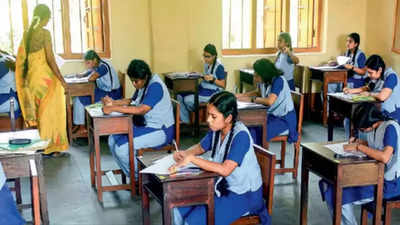Centre amends RTE rules, states can now fail students in classes 5 and 8

The central government has officially amended the Right of Children to Free and Compulsory Education (RTE) Rules, 2010, giving state governments the power to conduct regular examinations for students in Classes 5 and 8, with the provision to hold them back if they fail. This significant move marks a departure from the long-standing “no-detention” policy, which had been a cornerstone of India’s educational framework since the enactment of the RTE Act in 2009.
Key Changes in the RTE Rules
The amendments, which were notified in December 2024, come five years after the Right of Children to Free and Compulsory Education Act (RTE Act) was itself amended in 2019. Under the revised rules, state governments are now authorised to conduct annual examinations at the end of each academic year for students in Classes 5 and 8. If a student fails these examinations, they will be provided with additional instructional support and given a second chance to appear for a re-examination after two months. If the student still fails to meet the promotion criteria, they will be detained in the same class.
This move has sparked a mix of reactions across the country. Some states, including Gujarat, Odisha, Madhya Pradesh, Jharkhand, Karnataka, and Delhi, have already decided to implement measures that will hold back students who fail in these classes. However, not all states are on board with this change. Kerala, for instance, has expressed strong opposition to conducting examinations for students in Classes 5 and 8, arguing that it could increase the pressure on young learners.
A Shift from the No-Detention Policy
The RTE Act’s original version, introduced in 2009, featured a “no-detention” policy, which prohibited schools from holding children back in the same grade if they failed an examination. The idea behind this policy was to ensure that children, particularly those from disadvantaged backgrounds, would not be discouraged from continuing their education due to failure. This policy remained in place until 2019 when it was amended by the Parliament following concerns raised by various stakeholders.
Critics of the no-detention policy argued that it led to a lack of accountability and academic rigor. Many believed that children were promoted without acquiring essential knowledge, leaving them ill-prepared for more demanding exams at the higher education level. Furthermore, it was pointed out that the policy led to an increasing number of students failing in Class 10 board exams, as they were not properly equipped with the foundational skills necessary for success.
State-Specific Implementation and Resistance
While the new rules give states the flexibility to decide whether to implement regular exams for Classes 5 and 8, they are also required to follow a few guidelines to ensure that the process is fair and equitable. According to the amended rules, no child can be expelled from school until the completion of Class 8, irrespective of their performance in exams. However, schools are now empowered to make children repeat their classes if they do not meet the academic standards.
Several states have already adopted the new rules with varying degrees of enthusiasm. In Gujarat, Odisha, and Madhya Pradesh, the policy to detain students who fail in Class 5 or 8 has been put into practice, with schools conducting rigorous assessments. Delhi has followed suit, announcing that it will introduce a system of regular examinations for these classes. However, Karnataka, which initially implemented the policy, faced a setback when the Karnataka High Court scrapped its plan to hold public exams for Classes 5, 8, 9, and 11 in March 2024. The court’s ruling has prompted some uncertainty about the future of this system in the state.
On the other hand, some states, particularly Kerala, have remained vocal in their opposition to this shift. They argue that regular exams could exacerbate the pressure on young students, potentially leading to higher dropout rates and a decrease in overall student well-being. These states believe that the emphasis should instead be on improving the quality of teaching and providing additional support to struggling students rather than penalising them through detention.





